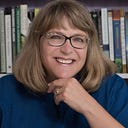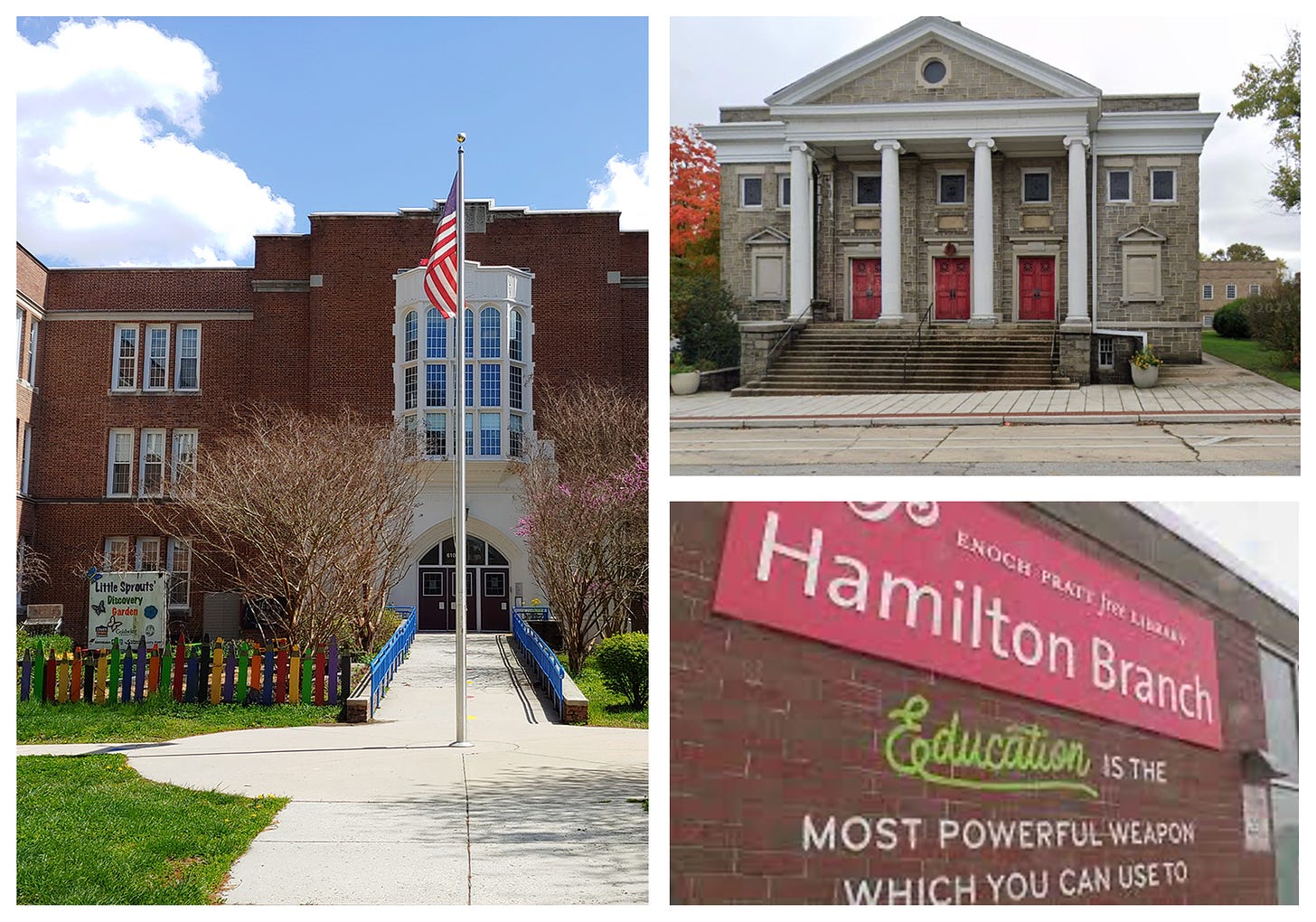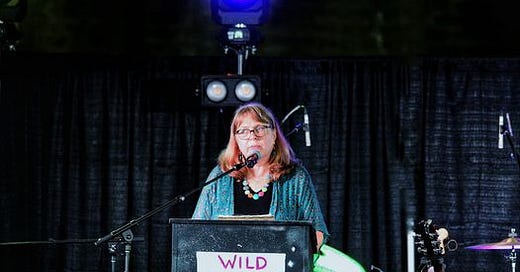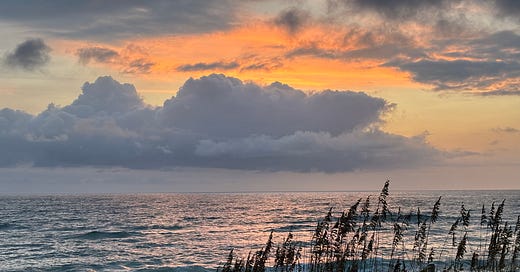

Discover more from The Cottage
The Holy Trinity: Church, School, Library
All are threatened -- and that really matters for democracy
Autumn is nearly here, a season that makes me vaguely nostalgic with memories of school supplies, new books, and the crisp air of change. I don’t know why fall makes me look back, but it just does.
This year, I’ve been ruminating on the three institutions that shaped my childhood recollections: church, school, and library.
Church was the Methodist church in our neighborhood, a congregation founded with the aid of some of my ancestors; school was a Baltimore City public elementary school where, as family lore tells it, my great-grandfather was on hand at the dedication of its handsome building; and the library was the local branch of Baltimore’s Enoch Pratt Free Public Library. They made up a holy trinity of sacred places for me, and other than the family home and my grandfather’s florist shop, I spent much of my girlhood in these three buildings. These spaces gave me three gifts: faith, learning, and imagination.

Although I didn’t recognize it until much later, they also shaped my political outlook. It is easy to recall bad days in all three. The boring Sunday school class. The playground bully or an assignment gone awry. A book stolen from the shelves. But the good things about them were really good. Soaring hymns, tiny crackers, and potluck suppers. Caring teachers who introduced new ideas. And whole shelves of Nancy Drew, Sue Barton, Anne of Green Gables, and histories of everything. Without trumpeting it, they taught me about democracy, local community, equality, citizenship, and the common good — about the past, about the world in which I lived — and inspired me to think about the future.
There’s an academic term (one that, like all academic terms, is always being revised!) for my growing-up world: social capital, defined by the Oxford dictionary as “the networks of relationships among people who live and work in a particular society, enabling that society to function effectively.” Some scholars (though not all) insist that social capital generates reciprocity (sharing, gratitude, mutuality, common good) and trustworthiness (cooperation, connectedness, information). There’s an argument to be made that such networks succumb to racism and create inequality; there’s also an argument to be made the such networks foster interconnectedness and promote egalitarianism.
While recognizing the ways social capital has been misused for nefarious ends (what, may I ask, hasn’t been?), I lean toward the more generous view of social capital, fueled, in part, by my experience with the holy trinity of sanctuary, classroom, and reading room. Without those three places, I can’t imagine who I’d be. Nor can I imagine that I would have learned to question, explore, reflect, and reevaluate the meaning of my own life, to understand this moment in history, or to use my gifts toward a better human future.
All of this goes to why I feel sad this autumn. It is one thing for the institutions of social capital to change (these institutions have changed through time) or decline (endings are part of human experience), but it is an entirely different thing for them to be scapegoated and purposefully shredded for malevolent purposes.
And that’s what is happening now — church, school, and library are under assault, mostly by religious and political fundamentalists seeking to undo reciprocity and trustworthiness and replace them with authoritarian power and propaganda.
This assault, of course, goes back some decades. Mainline and liberal churches were attacked relentlessly by rival evangelicals and fundamentalist preachers and by propaganda from organizations like the Institute on Religion and Democracy, a group founded with the sole purpose of destroying mainline denominations. Public schools have long been targeted by both the political and religious right, especially after those schools became integrated. A major policy dream of these right-wing groups has been to destroy public education and force American children into either privately funded schools (run by education corporations) or into religious education. The degrading of public libraries has been accomplished mostly through budget cuts under the guise of saving taxpayer money. But there’s long been a quieter push to censure books that has recently — and loudly — emerged as the focus of hobbling (or dismantling) their mission.
The important question to ask is: Why? Why is so much venom and hate spewed over these institutions? Why is such invective and fear stirred up around these bastions of social capital? And why have enormous political and economic resources been thrown into the projects to destroy this trinity of common good?
I think it is precisely because they worked.
I’m under no illusions as to how imperfect they were (and are), and I have seen them struggle with their own complicity in some significant cultural problems. But, given that caveat, my experience — and the experience of millions of other Americans shaped by congregation, school, and library — testifies to the power of those very institutions to inspire democratic participation, nurture equality, and give people a shot at a decent and fulfilling life.
The attacks prove their success at creating a democratic social vision, one that presses toward justice, fairness, and the better angels of our nature.
This, of course, is the same reason why unions were attacked. Or social safety net programs. Or things like assault weapons bans and sensible gun control. Or journalism. These things were undone because they strengthened reciprocity and trustworthiness, and thus created the possibility for a genuinely more equal society. When they functioned well, these institutions enabled greater justice and fairness for all.
I don’t think this was the result of any kind of massive conspiracy. Rather, it was a kind of cluster of players moving in similar directions with a variety of motives — loosely bound together and acting as vampire social capitalism hedge funds. There were those with ideological, philosophical, and theological motives; corporations with economic and market ones; leaders with political and narcissistic ones; individuals out for revenge or power; and some people who take pleasure in cultural despair, chaos, and destruction.
Sadly, the institutions themselves did stupid things — and played into the hands of those seeking to undo them. Maybe we were careless with what we inherited. But maybe there were external forces we didn’t quite recognize until we were far along the path of loss. Many people just didn’t see this all coming.
The moral of this tale is that once social capital is eroded or exterminated, you’ve only got capital left. And that’s bad. What remains is in the hands of the few, leaving the rest of us to scurry around — and some to engage in violence — to protect or take what we think we’ve got coming to us. At some point, it pretty much devolves into a Hunger Games scenario.
Sometimes people ask me why I care about dying churches, those dinosaur mainline ones with emptying pews. The reason is pretty simple — they are outposts, little pockets of potential resistance to the emerging political and social nihilism, and repositories of memories of democracy and common good. Like public schools and libraries — and some other institutions that weren’t part of my holy trinity (but may be part of yours).
So, they are worth saving. Because at their best, churches, schools, and libraries can shape the future of a diverse, inclusive democracy within their walls — for a society based in reciprocity and trustworthiness.
This autumn is no time for nostalgia. It’s time to contend for the future by attending to what was good from the past.
COTTAGE NEWS
This Thursday, September 7, I’ll be hosting an online conversation for the Cottage community with Robert P. Jones, president of Public Religion Research, and author of the newsletter White Too Long, about his new book, The Hidden Roots of White Supremacy and the Path to a Shared American Future.
Hidden Roots released this week to excellent reviews. The book was excerpted in TIME magazine. You might have seen him on Joy Reid’s MSNBC show a few days ago. You can watch a short video about the purpose behind the book HERE.
THIS EVENT WILL BE A LITTLE DIFFERENT THAN MOST COTTAGE ONLINE GATHERINGS — READ CAREFULLY, PLEASE!
FOR PAID SUBSCRIBERS: On Thursday September 7 at 7:30 PM Eastern, paid subscribers will be able to listen to the live conversation with the opportunity for Q&A. The Zoom link will be sent to all paid subscribers at noon on Thursday.
This online gathering will NOT replace the usual Third Thursday conversation. Paid subscribers will meet again on September 21 (TBA) for that monthly event.
FOR THE ENTIRE COTTAGE COMMUNITY: On Friday September 8, I’ll send out the recording to EVERYONE at the Cottage. This is an important book and raises issues of history and identity that will be front-and-center in American politics over the next year. And it addresses larger concerns of colonization and racism across western nations.
If you’d like to become a paid subscriber to support the work of The Cottage and have full access to all content, you can sign-up or upgrade by clicking the button below (all the information you need is at the link).
If you can’t afford a subscription, please know that no one is ever turned away for lack of funds. Just email us at the.cottage.email@gmail.com.
INSPIRATION
I wish I could find that skinny, long-beaked boy
who perched in the branches of the old branch library.
He spent the Sabbath flying between the wobbly stacks
and the flimsy wooden tables on the second floor,
pecking at nuts, nesting in broken spines, scratching
notes under his own corner patch of sky.
I'd give anything to find that birdy boy again
bursting out into the dusky blue afternoon
with his satchel of scrawls and scribbles,
radiating heat, singing with joy.
— Edward Hirsch, “Branch Library”
Then said a teacher, Speak to us of Teaching.
And he said:
No man can reveal to you aught but that which already
lies half asleep in the dawning of your knowledge.
The teacher who walks in the shadow of the temple,
among his followers, gives not of his wisdom but rather of his
faith and his lovingness.
If he is indeed wise he does not bid you enter the house of
his wisdom, but rather leads you to the threshold of your
own mind.
The astronomer may speak to you of his understanding of
space, but he cannot give you his understanding.
The musician may sing to you of the rhythm which is in all
space, but he cannot give you the ear which arrests the
rhythm nor the voice that echoes it.
And he who is versed in the science of numbers can tell of
the regions of weight and measure, but he cannot conduct
you thither.
For the vision of one man lends not its wings to another man.
And even as each one of you stands alone in God’s
knowledge, so must each one of you be alone in his
knowledge of God and in his understanding of the earth.
— Kahlil Gibran















Thank you Diana. My soul aches with the short sighted attacks on these institutions. I become so emotionally upset and I treasure your understanding and voice to what’s happening, as I cannot express these thoughts. I, however; can use your thoughts to better understand and hopefully share.
A well written and very thoughtful piece. There is another part that could be added to our social capital, and that is the soil which is also being rapidly degraded by industrial farming; this too in the interests of financial gain and control over resources. It is interesting to note how much of the common purse is directed toward keeping destructive farming practices going, even though we know that those practices are harming our environment and health. The same holds true for the medical/pharmacological industrial complex.